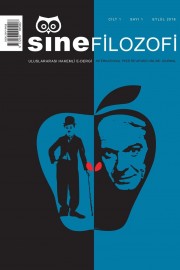Varlığın İçkinliğinden Türeyen Hayat Fikri
The Idea Of Life Derived From Immanent Being
A Look At The Cinema Of Abbas Kiarostami, Nuri Bilge Ceylan, Zeki Demirkubuz
Author(s): Serdar GezerSubject(s): Philosophy, Fine Arts / Performing Arts, Philosophical Traditions, Existentialism, Film / Cinema / Cinematography
Published by: Serdar Öztürk
Keywords: Spinoza, Kiarostami; Demirkubuz; Ceylan; Death; Immanence of Existence; Metaphysics in Cinema;
Summary/Abstract: After 2000 Turkish Cinema is marked by feelings of sorrow and grief that derive from the idea of transcendent being. In the films of Nuri Bilge Ceylan and Zeki Demirkubuz, the pioneers of this kind of cinema, the sorrows of death and seperation contaminate the characters and the audience. In contrast, the cinema of Abbas Kiarostami, who has been an influential figure for both Ceylan and Demirkubuz, is characterized by the joy which is a direct result of the idea of an immanent life. This article investigates the reasons for this aspect of Kiarostami’s cinema on the basis of the immanent metaphysics of Spinoza, and tries to understand how his cinema is able to differentiate itself in comparison to those of Ceylan and Demirkubuz. Qualitative textual analysis method is used in this article. As an outcome of this research it is reached that rather than to criticise the dominant ideological discourse about the perception of life and death in society, the cinemas of Demirkubuz and Ceylan reproduce aforementioned discourse.
Journal: SineFilozofi
- Issue Year: 1/2016
- Issue No: 1
- Page Range: 64-88
- Page Count: 25
- Language: Turkish

